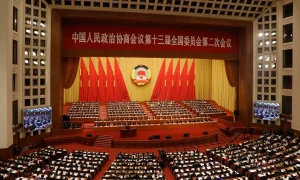One-party state

A one-party state or one-party system is a type of sovereign state in which only one political party has the right to form the government, usually based on the existing constitution. All other parties are banned or allowed to have only limited and controlled participation in elections. Sometimes the term de facto one-party state is used to describe a dominant party system that, unlike the one-party state, allows (at least nominally) democratic multiparty elections, but existing practices or the balance of political power prevent the opposition from taking place. to gain power.
The Committee of Union and Progress (CUP) government in the Ottoman Empire after the 1913 Ottoman coup d'état is considered the first single-party state.
Concept
One-party states explain themselves through various methods. Very often, advocates of a one-party state argue that the existence of separate parties works against national unity. Others argue that the single party is the vanguard of the people and therefore its right to rule cannot be legitimately challenged. The Soviet government argued that multiple parties represented the class struggle and because of this, the Soviet Union legally authorized and recognized a single party that led the proletariat, namely the Communist Party of the Soviet Union.
Some one-party states only ban opposition parties, while allowing allied parties to exist as part of a permanent coalition, such as a popular front. However, these parties are largely or completely subservient to the ruling party and must accept the ruling party's monopoly on power as a condition of their existence. Examples of this are the People's Republic of China under the United Front, the National Front in the former East Germany, and the Democratic Front for the Reunification of Korea in North Korea. Others may outlaw all other parties but allow non-party members to run for legislative seats as independents, as was the case with Taiwan's Tangwai movement in the 1970s and 1980s,
Within their own countries, the dominant parties that rule over single-party states are often known simply as the Party . For example, in reference to the Soviet Union, the Party meant the Communist Party of the Soviet Union; referring to the pre-1991 Republic of Zambia, he was referring to the United National Party for Independence.
Most one-party states have been governed by one of the following:
- A party that supports the ideology of Marxism-Leninism and the avant-garde (sometimes described as "communist states", such as the Soviet Union)
- A party that supports a nationalist or fascist ideology (such as the Kingdom of Italy under the National Fascist Party or Germany under the Nazi Party)
- A party that came to power after independence from colonial rule. One-party systems often emerge from decolonization because a single party gains an overwhelmingly dominant role in liberation or independence struggles.
One-party states are generally considered authoritarian, to the extent that they are occasionally totalitarian. On the other hand, not all authoritarian or totalitarian states operate under the rule of a single party. Some, especially among absolute monarchies and military dictatorships, do not need a ruling party and therefore declare all political parties illegal.
Contenido relacionado
Fianna Fáil
Relaciones exteriores de Botsuana
Estatismo